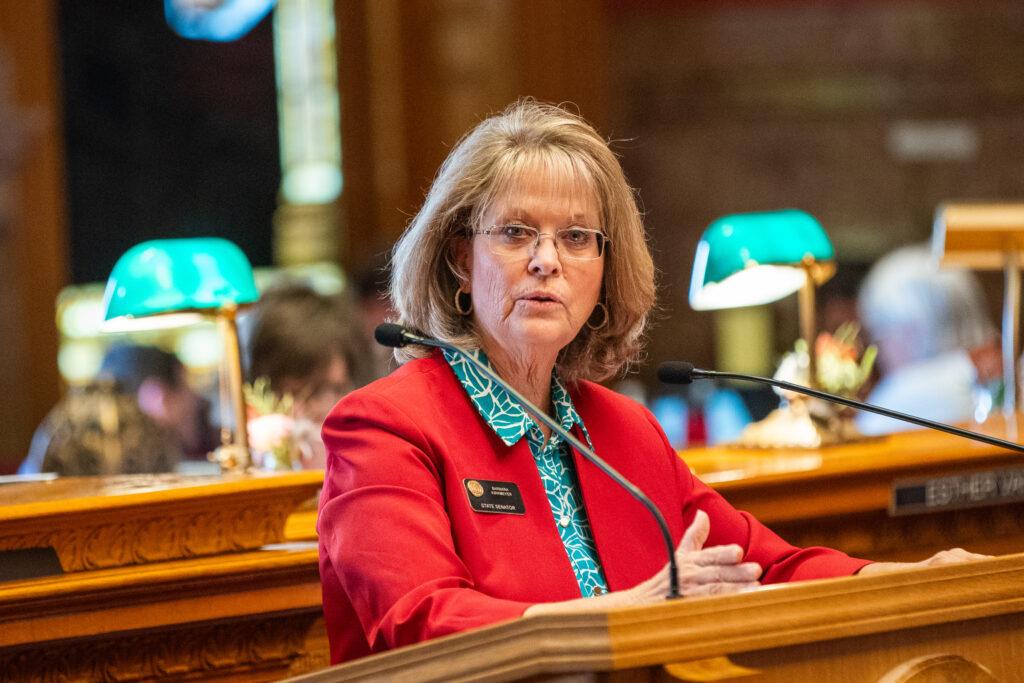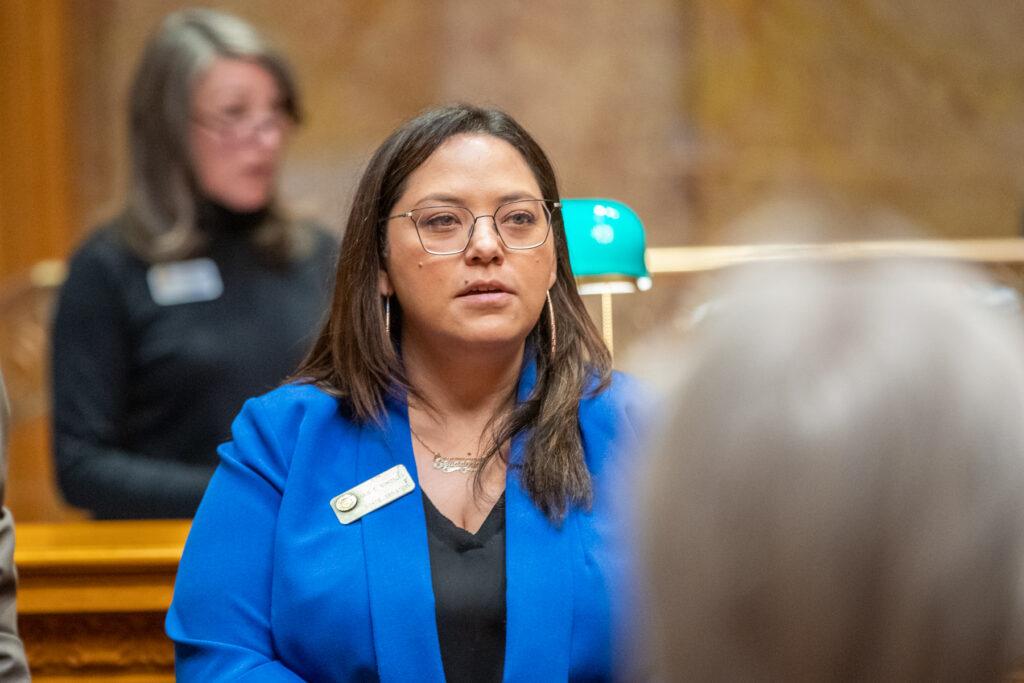
This story was produced as part of the Colorado Capitol News Alliance. It first appeared at coloradosun.com.
The Colorado Senate gave preliminary approval early Friday to a bill that would ban the manufacture and sale of semiautomatic rifles, shotguns and pistols, but the chamber added a major carveout for people who complete a training course to be regulated by and offered through the state.
The exemption, tacked on by Democrats in an effort to appease Gov. Jared Polis, represents a significant watering down of the measure. But proponents of the legislation felt it was needed to advance Senate Bill 3 after two delays to allow for more negotiations with the governor’s office.
Some Democrats in the Senate were wary about voting for the measure if Polis was eventually going to veto it. With the carveout, the governor has signaled he will sign the bill into law if it passes the House, as is widely expected.
To qualify for the carveout, a gun purchaser would have to be vetted by their local sheriff through a process similar to what’s required to obtain a concealed carry permit. Then, if they already have a hunter safety certification, they would have to complete a roughly four-hour training course to be offered by a third-party vendor — someone who is a qualified firearms instructor — through Colorado Parks and Wildlife.
Without a prior hunter safety certification, a purchaser would have to complete roughly a dozen hours of training over two days.
The course would focus on gun safety and specifically semiautomatic weapons. It would also include information about gun deaths associated with mental illness and Colorado’s red flag law, which lets a judge order the temporary seizure of guns from someone deemed an imminent risk to themselves or others.
Eligibility for the exemption would be contingent upon people receiving a score of at least 90% on a test at the end of their training course. Sheriffs would issue cards verifying completion.
Renewal, completed through a shorter refresher course, would be required every five years to continue to be eligible for the carveout.
The carveout was added to the bill through a five-page amendment to the bill adopted at about 1 a.m. Friday, more than seven hours into the Senate floor debate on the measure.
Another amendment adopted Thursday night would exempt a list of semiautomatic rifles, many of them historic military weapons and/or commonly used for hunting, from the bill. Those include the Benelli R1 Big-Game Rifle; M1 Carbine; Globco Tomahawk; Ruger Model 44; Springfield Armory M1A; and Winchester Model 1905, 1907 and 1910.
Debate on the bill stretched into Friday morning. It finally received preliminary approval before the full Senate at nearly 2 a.m.
Senate Bill 3, even in its weaker form, still represents one of the biggest changes to Colorado gun policy in state history. It would affect AR-15 and AK-47 rifles, as well as their long list of popular variants. It would also affect tactical shotguns and a small portion of handguns.
The measure would not affect possession of any guns in Colorado, meaning people who already own the guns that would be targeted by the bill could still keep and use their weapons.

“What we’re trying to do, and we continue to do, is try to save lives,” state Sen. Tom Sullivan, a Centennial Democrat whose son, Alex, was murdered in the 2012 Aurora theater shooting, said in his opening remarks on the Senate floor Thursday. He is a lead sponsor of Senate Bill 3. “We’re concerned about the next firearm. Not the ones you have.”
Sullivan was holding a picture of the 100-round drum magazine wielded by the shooter who murdered son. He held it up for the Republicans in the Senate to clearly see during his impassioned speech.
Sullivan has pitched Senate Bill 3 as a way to enforce the 15-round limit on ammunition magazines in Colorado that was passed in 2013 in the wake of the Aurora theater shooting. But the limit has been widely flouted, and magazines with a capacity greater than 15 rounds were used in two recent mass shootings — the Club Q shooting in Colorado Springs and the Boulder King Soopers shooting.
But the reality is Senate Bill 3 would have an effect on gun ownership far beyond enforcing the 2013 magazine law.
Yes, the measure would still allow people to buy the targeted weapons if they have fixed magazines with a capacity up to 15 rounds. But few manufacturers make firearms compliant with the legislation, which requires that those magazines be epoxied, welded or soldered onto a gun to adhere to the bill.
A fixed magazine is much slower and cumbersome to load. Bullets could be added to a weapon with a fixed magazine bullet by bullet, whereas a detachable magazine allows a gun user to reload in a matter of seconds.
Republicans in the Senate spoke uniformly in opposition to the bill Thursday. They offered amendment after amendment to the bill, each of which was rejected by the Senate’s Democratic majority.
“I just don't understand how this is supposed to help enforce the magazine ban,” said Sen. Byron Pelton, a Sterling Republican.
Sen. Barbara Kirkmeyer, a Brighton Republican, told Democrats that “your gun laws aren’t working,” pointing to the continuance of mass shootings despite measures passed by the legislature in recent years.

Sullivan and Sen. Julie Gonzales, a Denver Democrat and another lead sponsor of the bill, spent much of Thursday moving between the Senate and the governor’s office on the first floor as they worked out a deal with Polis on Senate Bill 3.
The governor’s office wouldn’t comment at length on the nature of the negotiations during the day Thursday, but after the carveout was adopted, a spokesperson for the governor said “Polis appreciates the sponsors working with our administration on amendments to help make Colorado safer while upholding our freedom and Colorado’s rich hunting and sport shooting culture.”
“Gov. Polis remains focused on improving public safety, including gun safety,” said Conor Cahill, the spokesperson.
Gonzales said the carveout was an acknowledgement of the concerns she and Sullivan have heard.
“Concerns from our dear governor,” she said. “Concerns from Coloradans. We’ve worked to address them.”

Republicans complained that the change was made on the fly and too late in the legislative process. They felt the bill should have been sent back for a committee hearing.
“I think the only fair thing to do for the citizens of Colorado is to send this back to committee,” said Sen. Rod Pelton, a Cheyenne Wells Republican. “This is a totally different animal.”
Senate Bill 3 still needs a final vote in the Senate, which could come as soon as early next week, before it advances to the House.
If the measure passes the legislature and is signed into law by the governor it would go into effect in September.
- Colorado is on track to raise the minimum age to buy firearm ammunition to 21
- Proposal to ban guns with detachable magazines clears first hurdle at the statehouse
- Colorado gun stores warn that semiautomatic weapons ban would make large share of their merchandise illegal
- Colorado to consider adding ‘Do Not Sell’ registry to prevent suicides from firearms
This story was produced by the Capitol News Alliance, a collaboration between KUNC News, Colorado Public Radio, Rocky Mountain PBS and The Colorado Sun, and shared with Rocky Mountain Community Radio and other news organizations across the state. Funding for the Alliance is provided in part by the Corporation for Public Broadcasting.








